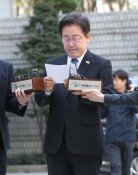Economic drive, the keyword of reshuffle
Economic drive, the keyword of reshuffle
Posted June. 16, 2014 01:57,
Choi Kyung-hwan, deputy prime minister for economy and strategy and finance minister nominee, said, The current regulations on mortgage loans are like the situation wherein one is wearing summer clothing during the winter. The remarks are apparently meant to suggest that loan regulations including loan to value ratio (LTV) and debt to income ratio (DTI), which were introduced during a realty market boom, cannot be maintained in the not appropriate in these economic hard times. On reform of state-run companies that has been stalled in the face of protest by their unions, Choi said, I will open the bottleneck and accelerate reform.
At a meeting with reporters at a beer pub in Seocho-dong, Seoul on Friday when Choi was nominated as deputy prime minister for economy, he said, I will comprehensively examine economic policy and reform things that require change. He indicated that he will aggressively push to implement policy more than the Park Geun-hye administrations first economic team led by the incumbent Minister Hyun Oh-seok, but some say that Chois team could end up taking overly excessive measures while implementing policy.
○ Economic revival by injecting money into market from banks
Choi commented on the current mood of the Korean economy by saying the "stuffy feel of blockage." He indicted that the economy seems to be booming in terms of figures, such as economic growth rate, investment, the number of employed population and export, but the people themselves are not actually feeling fruits from growth.
Easing of bank loans, which Choi had been emphasizing since he was serving as the floor leader of the ruling Saenuri Party, is a measure meant to boost economic conditions as sensed by people, which are in the doldrums. LTV is a system that only allows for loans worth 40 percent to 60 percent of the collateralized housing unit, while DTI is system that prevents principal and interest repayment for loans from exceeding 50 percent to 60 percent of the debtors annual income.
The government considered easing of loans in the past, only to be repeatedly blocked by financial regulators, which raised concern over possible excessive expansion of household debts.
If Choi, the central command of the economy and power elite, strongly pushes to ease loan restrictions in line with his belief, the financial regulators would not be in a position to stubbornly oppose the measure. Soon after Chois remarks were reported, a ranking office at a financial regulatory agency said, There will be opportunities to coordinate and refine policies through party-government consultative meetings and public hearings, leaving open the possibility to revise the systems.
If loan restriction regulations are revised, chances are high that they will only be partially adjusted, rather than being eased or outright lifted. As for LTV, it is reportedly considered to increase the 50 percent ceiling of LTV applied to the Seoul metropolitan region to 60 percent, the level currently applied to provincial regions, or easing to some extent regulations in realty speculation areas. As for DTI, it is reportedly considered to lift the regulations for certain groups of people, such as youth generations, newly married couples, and high-income earners.
Realty experts say that easing of LTV and DTI would increase demand for housing purchase, but it will unlikely lead to the shoring up of the economy. Park Won-gap, senior researcher for real estate at Kookmin Bank, said, Easing housing loan regulations will increase demand for homes, giving vitality to the real estate market. In comparison, Kim Gyu-jeong, a senior researcher for real estate at Woori Investment Securities, said, Household debts are in a serious situation. Easing of debt restrictions is a measure that is only effective during a period of housing price hikes, which only have limited effect on expediting realty transactions.
○ Possibility to fine-tune high exchange rate policy
There is a chance that Chois view of economy emphasizing economic recovery as perceived by people will come into conflict with the direction of existing policies in various fields. For instance, on the view that high foreign exchange rate is good for companies, but is not necessarily good from the peoples perspective, Choi said, If the value of the countrys currency increases (if the exchange rate falls), peoples purchasing power grows, adding, Now economic growth and peoples happiness should go in parallel. He is believed to indicate that although the government has used high exchange rate policy based on the principle that when the won-dollar rate is kept at the highest level possible, export increases and economy grows, but the government could adjust somewhat the direction of exchange rate policy to improve "peoples happiness."
However, Choi made it clear that the Korean economy should increase its dynamic vitality. He said, The Korean economy is an economy in the phase of youth or in the prime of life, but is prematurely aging, adding, When robust growth at a considerably high level continues for five to 10 years, then will the country be able to prepare for an aging society. He was negative about injection of state funds in the market aimed at stimulating economic growth. He claimed that rather than the governments injection of money to shore up the economy, it is more necessary to establish trust in the government and market.
○ Normalization of state-run organizations, reform of government officials post-retirement employment
Likewise, Choi has said that "there are limits to roles of monetary policy," but a growing number of officials in the government predict that Choi as power elite will set aside extra budget and launch efforts to stimulate the economy. However, since extra budget will eventually add to burden on the people, many critics have said that such a measure will become a policy generating little return despite heavy cost.
Hence, some watchers argue that rather than pushing to implement new policy, Choi should make achievements first in normalizing state-run organizations, and reform of government officials post-retirement employment at firms and organizations under government oversight, and accelerate policy for economic growth by using this as a steppingstone The task of normalizing state-run companies has been progressing at snails phase due to intense confrontation between managements and unions over the issue of whether bonuses should be reflected in average income in recent months, which Choi is urged to use his political influence and capacity to find a solution. On reform of government officials post-retirement employment at organizations under government oversight, Choi suggests as solution the slight extension of their employment period as civil servant. He means that if a civil servant retires at mid-50s, he or she has little to chance to find jobs, and thus seek employment at such firms and organizations, only to earn criticism labeling them as "government official-turned mafia," and hence the country can address the controversy by creating a culture of long-term employment that enables them to retire at late 50s.







